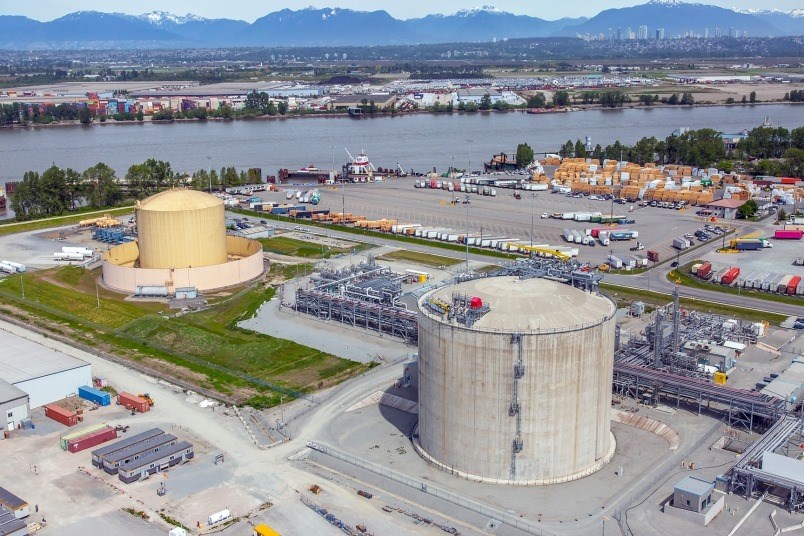Concerns compiled by Richmond city staff about the proposed expansion of the Tilbury liquefied natural gas plant warn of potential risks from the project and environmental impacts on the Fraser River, wildlife and the air.
City staff are asking council to endorse their comments about the Delta-based energy company, located across the river from Richmond, so they can be forwarded to both provincial and federal environmental assessment agencies.
The upgrade to the LNG plant is planned to begin within two years and it will include a new storage tank and a marine jetty. The company says they don’t plan to expand any further.
Richmond city staff, as noted in their report to council, are concerned about the proposed volumes of LNG – the expansion would allow for a capacity 163,000 cubic metres of LNG, an increase of more than 50 per cent from its current capacity.
Ian Finke, LNG operations director with FortisBC, said the plan is to have one vessel come to the jetty every five days, and the size is limited to 100,000 cubic metres of LNG – export ships usually carry 200,000 to 240,000 cubic metres of LNG.
Currently, Fortis trucks its LNG to ships where it’s used as fuel, for example, on BC Ferries vessels.
Citing the volatility of LNG, the Richmond city staff report highlights risks to the community and the Fraser River in regards to spills, accidents, malfunctions and security breaches.
LNG is natural gas – which is largely methane – that is compressed by reducing its temperature to -162 degrees Celsius so that it can be stored and transported in a liquid form.
Finke pointed out LNG is stored in sealed double-walled containers that prevent oxygen from entering and igniting the fuel. Furthermore, any leak of LNG would just turn into a vapour that would dissipate into the air.
“At the site itself, as we transport LNG, safety is paramount (with) many, many safety considerations at play,” Finke said.
Finke said LNG is one of the cleanest-burning fossil fuels, with 21 per cent less greenhouse gas emissions than other marine fuels currently being used.
It also emits less harmful gases and emits hardly any particulate matter, Finke explained.
“It does a good job of displacing higher carbon fuels, so from our point of view that’s a good thing,” Finke added.
But Richmond city staff note the project doesn’t align with Metro Vancouver air quality objectives and cites concerns about nitrogen oxide, carbon dioxide, sulfur dioxide, hydrocarbons and other particulates.
Light, noise and atmospheric pollution from the expanded plant are also a concern for local wildlife and the community, the report explains; furthermore, the expansion adds to the industrialization of the Fraser River estuary and its ecosystem.
“This project dos not align with local, provincial national strategies to reduce greenhouse gas emissions and reduce B.C.’s economic reliance on fossil fuels,” the city staff report states.
Finke said these are all considerations that they will look at as they move forward with the project design, which is only in its initial phase.



